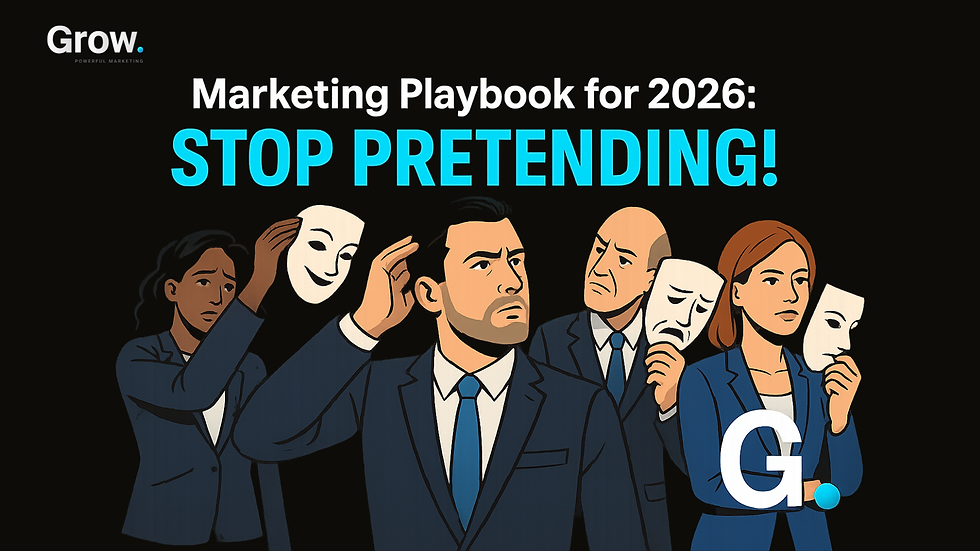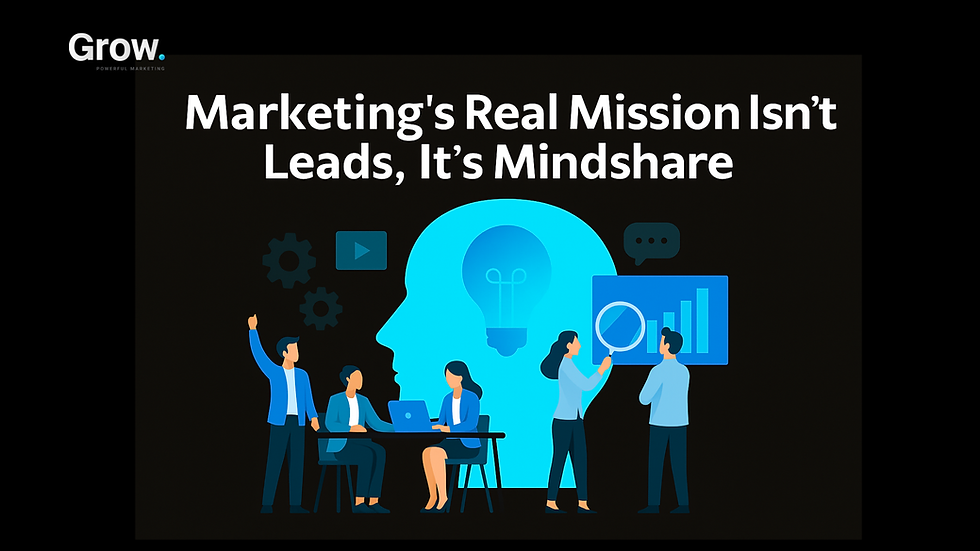What an AI-First iCMO Does That Your Current CMO Probably Can’t
- Grow
- Sep 17, 2025
- 3 min read

Are you still expecting to deliver modern growth under outdated constraints?
That’s the trap most companies are in right now.
It’s not that CMOs are bad at their jobs.
It’s that the job itself has changed — and they haven’t.
The CMO Role Has Outgrown Itself
A CMO's core purpose is to be the creative mastermind behind a company's brand, crafting compelling stories and experiences that resonate with millions of customers while also developing and implementing comprehensive marketing strategies that align with business objectives.
Today, the modern CMO role requires fluency in AI technologies combined with human creativity, leading digital transformation efforts, and applying AI across personalization, competitive analysis, and performance forecasting (CMSWire, 2025).
To remain competitive, modern CMOs must operationalize AI fully across strategy, talent, and technology. A lack of AI adoption risks performance decline, talent loss, and budget inefficiencies, while the "AI-native advantage" fosters deeper personalization (Matrix Marketing Group, 2025).
As such, an AI-First iCMO is the strategic transformation leader brought in to bridge the gap between traditional marketing and AI-powered growth.
Positioned at the intersection of data, creativity, and commercial strategy, this interim role exists to accelerate marketing modernization without waiting for long-term leadership hires to catch up.
They can reclaim definitive ownership of the customer journey by using AI to deliver a cohesive, hyper-personalized experience at scale. They are able to amplify human creativity with AI-driven efficiency and reach, transforming compelling ideas into quantifiable, high-ROI outcomes.

What an AI-First iCMO Brings to the Table
An AI-First Interim CMO (iCMO) is the indispensable leader of this new era.They’re built for speed, precision, and scale.
Here’s the difference:
From Intuition to Prediction → They use AI to forecast customer behavior in real time.
From Static Segments to Hyper-Personalization → They turn unstructured data into individualized journeys at scale.
From Manual Ops to Autonomous Ops → They automate execution so your team focuses on strategy, not spreadsheets.
Why This Matters for CEOs and Leaders
Organizations that operationalize AI across strategy, talent, and structure are already seeing:
5–8x returns from personalization.
43% reduction in cost-per-acquisition (B2B SaaS case).
Campaigns with 37%+ CTR lifts and viral scale (Mastercard, Heinz, Nutella).
In contrast, companies clinging to legacy marketing models face rising costs, declining engagement, and a widening talent gap.
This Isn’t Just Marketing. It’s Growth at Stake
Every customer touchpoint now matters more than ever — the ad they scroll past, the email they open, the assistant they chat with, the store they walk into. Each one is either reinforcing your brand or eroding it.
Thriving in this AI-first era means more than clever campaigns. It requires knowing when to amplify human creativity with AI-enabled content and when to unleash AI-originated output at scale.
The winners will be the companies that master this balance of blending people and technology into a growth engine that feels seamless to the customer but delivers exponential ROI to the business.
If your current CMO can’t deliver AI-powered growth, it’s not their fault. They weren’t built for this era.
So ask yourself:
Are you betting your growth on yesterday’s CMO… or today’s AI-First iCMO?
Let’s talk.→ www.growpowered.com
Fractional AI-first CMOs. Full-scale impact.
References:
BCG. (n.d.). CMOs must protect the brand in an AI-first world. BCG. https://www.bcg.com/publications/2025/cmos-must-protect-brand-in-ai-first-world
CMSWire. (2025). The modern CMO: Data-driven, AI-native and creatively human.
IDC. (2025). CMOs in the age of AI: New mandates and responsibilities.
LinkedIn. (2025). The changing role of the CMO in the age of AI.
McKinsey & Company. (n.d.). The changing role of the CMO—and what it means for growth. Retrieved September 17, 2025, from https://www.mckinsey.com/capabilities/growth-marketing-and-sales/our-insights/the-changing-role-of-the-cmo-and-what-it-means-for-growth
McKinsey & Company. (2015, October 31). Personalizing at scale. McKinsey & Company. https://www.mckinsey.com/capabilities/growth-marketing-and-sales/our-insights/personalizing-at-scale
Marstudio. (2024). How CMO's use AI: Transforming efficiency in the digital age
Matrix Marketing Group. (2025). The AI CMO manifesto: Redefining marketing leadership in the age of AI.
VMblog. (2024). Role of a CMO in the age of AI.




Comments